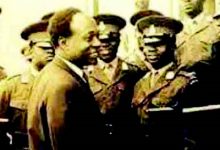I was glad that it was former president Joachim Chissano of Mozambique who won the first Mo Ibrahim prize for leadership in Africa in 2007. [Google Mo Ibrahim Prize]
I’ve met Mr Chissano and he is a soft-spoken, very polite, self-effacing man, who doesn’t look at all like the tough guerrilla who was closely at the side of Africa’s superhero, the late Samora Machel, for most of the time that the two led the Front for the Liberation of Mozambique (Frelimo) in an epic struggle against Portuguese colonialism in the late 1960s and early 1970s.
I had the singular thrill of interviewing Samora Machel (with Chissano as Interpreter from Portuguese into English!) when the two gentlemen attended an OAU Liberation Committee meeting in Accra in January 1973. In the interview, they spoke confidently about the victory Mozambique was going to win soon against Portuguese colonialism.
STRUGGLE
They would prove, with FRELIMO’s victory, that armed struggle could be successful in Africa, even if the opponent the freedom fighters were combating was a powerful country, with military ties to as strong an international military organisation as the North Atlantic Treaty Organisation (NATO). Portugal was, of course, a valuable member of NATO, because it controlled military installations in the Azores Islands, which formed part of NATO’S global defence system against the Soviet Union.
Their predictions came true in 1975, when Portugal left Mozambique with its tail between its legs. FRELIMO was again instrumental in demonstrating that “white power” was doomed in Africa, when it defeated white invaders sent by South Africa to Mozambique to root out the ANC freedom fighters based in Mozambique, who were making sporadic inroads into South African territory.
The only thing I don’t fully understand is why, up till today, Mr Chissano and FRELIMO appear to have been unable to unearth, and tell the world, the full facts surrounding the air crash in which Mr Machel was killed in October 1986. I personally suspect that the agreement of Nkomati, which the Mozambique government reached with the South African apartheid regime in March 1984, might have opened up Mozambique in some way to South African agents, who had two full years to exploit these openings to affect the murder of Machel.
Not only that – the arch-traitor, Mobutu Seseseko of Zaire, had his aircraft in the vicinity of Lusaka, Zambia, at the same time as the Mozambique leader’s aircraft was communicating with the Lusaka airport. Is it possible that Mobutu’s aircraft provided a communications centre that enabled South African agents to feign to be operating from one of the airports Mr Machel’s plane would be communicating with, on its way back to Maputo? Certainly, misdirecting an aero-plane was not a feat that was beyond the tech-savvy operators that South Africa and its allies could deploy in those dark days?
You see the issue of whether Machel might have begun to have second thoughts about the Nkomati agreement, when he was struck down by the South Africans, cannot be dismissed out of hand. (Google Nkomati agreement).
I have been strongly suggesting that Mr Chissano should use the resources now made available to him by the Mo Ibrahim Prize, to go to South Africa and dig deep into the secret files of the apartheid regime to discover the hidden truth and — tell the world! I think South Africa’s President, Mr Cyril Ramaphosa, may be inclined to help him in that task.
DUTY
Mr Ramaphosa, no less than Mr Chissano, owes Africa a sacred duty to help bring out all the facts and thus put an end to the conspiracy theories that are rife on Mr Machel’s murder. In any case, Africa needs to know all the facts about its struggle for freedom.
On the prize itself, my view is that, as it stands, its value is likely to be viewed with scepticism in many quarters in Africa. There are far too many causes in Africa in urgent need of monetary assistance for the pampering of former heads of state to be considered a priority. River blindness, guinea worm, dangerous water holes, and, of course, bad, under-funded schools, are just a few areas in need of urgent funding.
Besides, a majority of African heads of state tend to be pompous and egoistic while in office and should not continue to be lionised when they do leave office. It can be argued that African heads of state are not in charge of the arrangements surrounding their personal comfort, after they leave office. But there’s nothing stopping them from repudiating any offers made to them that they consider ostentatious, is there?
It is also true to say that African heads of state voluntarily seek election to office under a constitution and terms of office that are known to them before they put themselves forward for candidacy. It is their duty to live within their means while in office and to save – like their fellow citizens – so that they can supplement their pensions (usually the salary at which they retire, plus quite a few privileges, such as housing and transportation) in order to live a dignified life in retirement.
To award them a prize mainly because they have obeyed their constitution and not prolonged their stay in office, which appears to form the bare bones of the motivation for the prize, is to be inordinately indulgent towards them. The true lesson African leaders need to learn is a humility that enables them to keep their feet on the ground, so that they can feel the needs of their people and truly strive to meet them.
And what about the idea that the prize will help to deter African leaders from putting their fingers in the national till and helping themselves to its contents? That’s a no-brainer: for corruption is not necessarily driven by need so much as by greed. And there isn’t enough money in the world to satisfy true greed.
By Cameron Duodu





